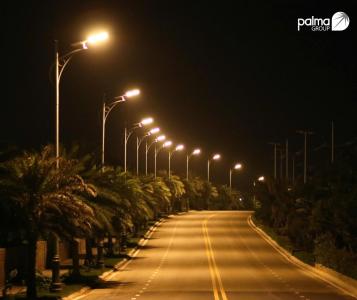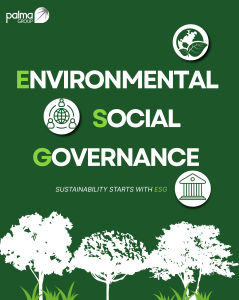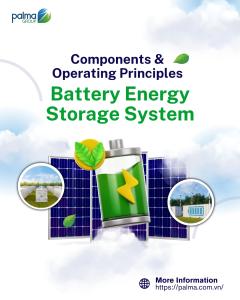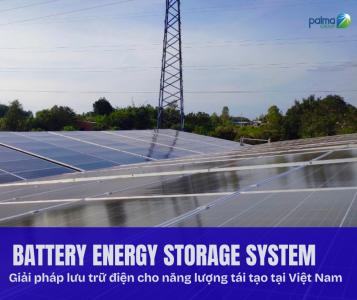News
PALMA SOLUTIONS JSC
Battery Energy Storage System (BESS): A Key Storage Solution for Renewable Energy in Vietnam
In the context of Vietnam’s accelerating energy transition, the Battery Energy Storage System (BESS) has emerged as a pivotal solution to enhance the efficiency of renewable energy utilization, particularly solar and wind power. The deployment of BESS not only alleviates pressure on the national grid but also creates opportunities for Vietnam to move closer to its 2050 Net Zero emissions target.
1. Reducing Renewable Energy Curtailment and Supporting Grid Stability
According to the Vietnam Country Climate and Development Report by the World Bank (2022), one of Vietnam’s major challenges in harnessing renewable energy lies in the intermittency of supply. Storage systems, including BESS and pumped hydro, play a crucial role in load balancing, frequency stabilization, and reducing solar power curtailment during off-peak hours.
Research indicates that the adoption of battery energy storage systems could save billions of kWh annually by minimizing renewable energy losses (World Bank, 2022). This provides strong evidence of the direct benefits of BESS in Vietnam’s energy transition.
2. Investment Scale and Practical Insights
Globally, the World Bank, through the Energy Storage Partnership (ESMAP), committed support for 2,527 MWh of battery storage capacity across 14 projects, including six mini-grid projects during 2021–2022 (World Bank, 2023). These figures highlight the expanding global investment in energy storage technologies and the growing importance of BESS in renewable energy integration.
In Vietnam, according to the Comprehensive Study Report released by the Energy Transition Partnership (ETP) and the Directorate for Standards, Metrology and Quality (STAMEQ) in 2024, the BESS market remains nascent, though several commercial-scale pilot projects have already emerged. The report emphasizes the urgent need to establish national technical standards to ensure safety, efficiency, and integration with the national grid (ETP & STAMEQ, 2024). This is considered a crucial step in advancing Vietnam’s energy transition.
3. Promoting Standardization and Regulatory Frameworks
A significant challenge today lies in the absence of harmonized standards and regulations for battery energy storage systems (BESS). According to UNDP Vietnam (2025), developing a national set of BESS standards aligned with international frameworks (IEC) is essential to attract investment, ensure transparency, and strengthen market confidence.
Experts also note that standardization would not only enhance the operational safety of energy storage systems but also pave the way for domestic manufacturing, reduce import costs, and improve the competitiveness of Vietnam’s energy sector in the region.
Through these perspectives, the Battery Energy Storage System (BESS) is proving its increasingly critical role in Vietnam’s energy transition. With its capacity to store, regulate, and distribute electricity efficiently, BESS not only reduces renewable energy curtailment but also supports safe and flexible grid operations. However, to fully unlock its potential, Vietnam must rapidly develop a comprehensive regulatory framework and technical standards while simultaneously mobilizing investment capital and fostering international cooperation.
22/09/2025 11:51:29
News other
Explore the components, operating principles, battery technologies, and sustainable lifecycle of Battery Energy Storage Systems (BESS) – a key solution toward Net Zero.
Battery Energy Storage Systems (BESS) help Vietnam optimize renewable energy, stabilize the power grid, and accelerate the clean energy transition.
 PALMA SOLUTIONS JSC
PALMA SOLUTIONS JSC



_-10-12-2025-00-33-27.jpg)


![[PALMA x NOVALAND] WORKSHOP ON MAINTENANCE AND SERVICING OF SOLAR LANDSCAPE LIGHT PLL-30 AT NOVA HILLS – MUI NE [PALMA x NOVALAND] WORKSHOP ON MAINTENANCE AND SERVICING OF SOLAR LANDSCAPE LIGHT PLL-30 AT NOVA HILLS – MUI NE](https://palma.com.vn/upload/z3634653067260_15cb1f4d62b14f3a684fdf4ee9de4870_-11-08-2022-13-55-36.jpg)




_-24-10-2021-21-55-01.png)
_-21-04-2022-13-38-01.png)
